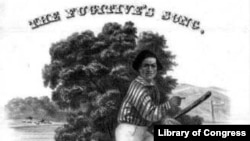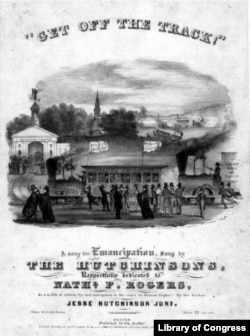December 18, 2013, was the 149th anniversary of the abolition of slavery in the United States. The fight to end slavery did not begin with the American Civil War. For more than 80 years before then, people used the tools at their disposal to fight for and against the enslavement of African-Americans. One of those tools was music.
When the United States became a nation, African slaves weren’t just picking cotton in Alabama. They were also cleaning houses in Pennsylvania and tending bar in New York City. But by the early 1800s, Northern states largely outlawed the practice and were pressing the South to do the same.
“Get Off The Track” was a song written and made famous by the most popular United States singing troupe of the 1840s and 1850s, the Hutchinson Family Singers. Scott Gac wrote a book about the Hutchinson Family called “Singing for Freedom.”
“'Get Off The Track' is very much the soundtrack to the anti-slavery movement of the 1840s in the way that 'We Shall Overcome' was the song of the 1960s and the Civil Rights movement,” he said.
The Hutchinson Family became famous by attaching themselves to the American Anti-slavery Society, a church-based group that fought slavery in the courts. They traveled the country, singing at Society meetings, selling sheet music for their songs and, Gac says, changing the way American reformers expressed themselves.
“The Hutchinson family singers don’t invent protest music, but what the Hutchinsons create, really as American singers they create the idea of a protest singer can make money,” Gac said.
As for those who were enslaved in the South, they were not able to protest slavery outright - they had no freedom. But they are known to have sung songs like "Go Down Moses," songs that addressed their slavery.
After the ratification of the 13th Amendment, African-Americans were - for the first time - allowed to start their own institutions of higher learning. Many of these schools formed choirs who toured the U.S. not only to raise money, but also to do something else, according to Kip Lornell, a professor at George Washington University.
“To present black choral singing in such a way that white people who - most of whom had never heard black choral singing like this - could appreciate the fact that blacks were not just uneducated and unable to do anything but sing older spirituals and work songs, but in fact had created a bold body of important works,” he said.
It was a tradition that would be carried on well into the 20th century as African-Americans would use song to protest for Civil Rights.
When the United States became a nation, African slaves weren’t just picking cotton in Alabama. They were also cleaning houses in Pennsylvania and tending bar in New York City. But by the early 1800s, Northern states largely outlawed the practice and were pressing the South to do the same.
“Get Off The Track” was a song written and made famous by the most popular United States singing troupe of the 1840s and 1850s, the Hutchinson Family Singers. Scott Gac wrote a book about the Hutchinson Family called “Singing for Freedom.”
“'Get Off The Track' is very much the soundtrack to the anti-slavery movement of the 1840s in the way that 'We Shall Overcome' was the song of the 1960s and the Civil Rights movement,” he said.
The Hutchinson Family became famous by attaching themselves to the American Anti-slavery Society, a church-based group that fought slavery in the courts. They traveled the country, singing at Society meetings, selling sheet music for their songs and, Gac says, changing the way American reformers expressed themselves.
“The Hutchinson family singers don’t invent protest music, but what the Hutchinsons create, really as American singers they create the idea of a protest singer can make money,” Gac said.
As for those who were enslaved in the South, they were not able to protest slavery outright - they had no freedom. But they are known to have sung songs like "Go Down Moses," songs that addressed their slavery.
After the ratification of the 13th Amendment, African-Americans were - for the first time - allowed to start their own institutions of higher learning. Many of these schools formed choirs who toured the U.S. not only to raise money, but also to do something else, according to Kip Lornell, a professor at George Washington University.
“To present black choral singing in such a way that white people who - most of whom had never heard black choral singing like this - could appreciate the fact that blacks were not just uneducated and unable to do anything but sing older spirituals and work songs, but in fact had created a bold body of important works,” he said.
It was a tradition that would be carried on well into the 20th century as African-Americans would use song to protest for Civil Rights.






